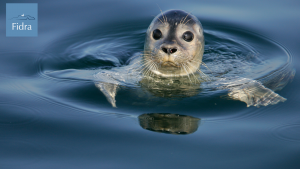Author: Hannah Evans, Project Officer, Fidra

We’ve all heard about the devasting effects of plastic pollution and we know our relationship with single-use materials needs to change. We’ve seen plastic bottles, food containers and shopping bags floating in the seas. We’ve watched footage of marine life swimming in a fog of our disposable debris. But how much is being said about plastic’s partner in crime, chemical pollution?
Marine chemical pollution, the invisible threat.
Industrial chemicals play an essential role in the running of our modern-day life. From life-saving medicine to climate change mitigation, chemicals offer us hope for a brighter future. But the way we currently manage chemicals is failing. Hormone disrupting chemicals, bisphenols, commonly used in paper receipts, tin cans and plastics, are polluting beaches across the world[i] and disrupting the reproduction of turtles, fish and other marine species[ii]. The ‘forever chemicals’, PFAS, used in everything from food packaging to cosmetics, are damaging the immune system, kidney function and liver function of bottlenose dolphins[iii]. Chemical flame retardants now contaminate marine animals globally, from penguins in the south, to gannets on Scotland’s very own Bass Rock[iv]. And chemical treatments used in Scottish salmon farming are free-flowing into surrounding waters with unknown consequences to marine and freshwater ecosystems[v].
Chemical pollution poses a very real and severe threat to ocean life. Not only is the industry one of the world’s biggest greenhouse gas polluters, using vast amounts of fossil fuels, energy and water[vi], it also exacerbates the dangers of plastic pollution[vii]. Plastic in itself is a mixture of different chemical compounds. These may be contaminants from the plastic production process, or additives used to give plastic certain desirable properties. Plastics also act as carriers of chemicals pollutants, meaning they can adsorb chemicals from their surroundings, transporting them through the environment. Once ingested, some of these chemicals are known to bioaccumulate, increasing in concentration in the body tissue of animals further up the food chain with potentially devastating effects for the ocean’s top predators. This has already been observed in some of Scotland’s own wildlife populations, with Scotland’s west coast orca population still under threat of extinction from reproductive damage caused by PCB contamination[viii].
Chemical pollution is intensifying both biodiversity loss and climate change, and left unchecked, will leave its mark for generations to come. But there is still time to turn the tide if we act now. Fidra’s work on chemical and plastic pollution, and Scottish Environment LINK’s Ocean Recovery Plan outline key and achievable goals needed to protect the future of Scotland’s seas.
Eliminating plastic and chemical pollution at source.
We know that plastic and chemical pollution are intrinsically linked and so to tackle the chemical crisis, we need to turn both taps off at the source. With multiple opportunities on the horizon, this is something Scotland is in unique position to achieve.
- Through Scotland’s marine and national litter strategy, and consultation on single-use plastics, we can outline clear and time-lined commitments to ending plastic waste.
- We can adopt Publicly Available Specification (PAS) for plastic pellet supply chains to protect against pellet pollution.
- We can build on the EU Single-Use Plastics Directive, including bans on items such as cutlery, coffee cup lids and plastic cigarette butts.
- We can set appropriate Environmental Quality Standards (EQSs) for chemical treatments used in Scottish aquaculture.
- We can introduce bans on non-essential chemical use, including intentionally added PFAS in food packaging and bisphenols used in paper receipts.
Advocate a world-leading approach to chemical management.
The UK Chemicals Strategy will outline how we as country approach chemical management post-BREXIT and is in development as we speak. It offers a once in a generation opportunity for us to redefine our relationship with industrial chemicals, how they’re assessed, monitored and regulated. Needless to say, it is an opportunity we cannot afford to miss. Scottish government must push for ambitious and time-lined commitments to more sustainable chemical use, more extensive monitoring regimes and a phase-out of the most hazardous chemicals from all non-essential uses. Fidra, along with 26 other health and environmental NGOs including some fellow LINK Marine Group members, have outlined 12 Key asks of the UK Chemicals Strategy that are fundamental to ensuring health and environmental protection are paramount.
Riding alongside the UK Chemicals Strategy is the development of the UK’s own chemical management body, UK REACH. For the dream of a sustainable chemical use to remain alive, UK REACH must at the very least remain aligned with regulations set by EU REACH. Deviation from EU regulations runs the risk of the UK becoming a ‘dumping ground’ for chemicals restricted elsewhere and falling behind on the most up-to-date safety data for chemicals already in use. But this is just a minimum. We now have the opportunity to go above and beyond EU regulations, setting our own ambitions and timelines for a truly world-leading chemical management system.
Outline commitments for a safe and effective Circular Economy.
The introduction of Scotland’s Circular Economy Bill presents so much promise. It’s a chance for us to leave our single-use habits behind and enter a new era of deposit return schemes, refill systems, and reusable… well, everything! But for this dreamy sustainable world to truly work, we must remove the barrier of chemicals contamination.
Hazardous chemicals can limit the success of a circular economy by risking the safety of secondary products. For example, chemicals approved for use in one product may wind up in products unsuitable for that substance, such as bisphenols in till receipts contaminating paper recycling and ending up in pizza boxes[ix]. Long-lived items may also contain chemicals that have since been restricted and so if recycled, may reintroduce banned substances into secondary products[x]. However, this could all be avoided by phasing-out the most hazardous chemicals from non-essential uses and ensuring transparency and traceability along supply chains. By mandating full chemical disclosure and introducing smart labelling, we will be able to track chemical substances along supply chains and make sure products unsuitable for recycling are disposed of safely.
Hope remains.
Addressing chemical pollution is no small task but it is possible, and Scotland is in a unique position to lead the way. With proactive and time-committed legislation, we can create a world-leading chemical management system, we can ensure a safe and thriving circular economy, and we can protect Scotland’s oceans for generations to come. It is all still possible, if we act now.
To find out more, see Scottish Environment LINK’s Ocean Recovery Plan and learn more about the work of Scottish environmental charity, Fidra.
Find out more about Marine Conservation Society position statement on PFAS: 2021_PFAS.pdf (buckup-mcs-production.s3.amazonaws.com)

Notes
[i] Kwon et al., 2020. Sandy beaches as hotspots of bisphenol A.
https://www.researchgate.net/publication/344234923_Sandy_beaches_as_hotspots_of_bisphenol_A
[ii] Fidra, 2018. Do you need a receipt? Why we should ditch tickets for the sake of our environment. https://www.fidra.org.uk/beat-the-receipt/
[iii] PFASFree, 2021. PFAS and the Environment. https://www.pfasfree.org.uk/about-PFAS#thepfasproblem
[iv] Fidra, 2021. How flame retardants impact our health and the environment. https://www.fidra.org.uk/projects/flame-retardants/
[v] Best Fishes, 2021. Impacts: Is salmon farming costing the Earth? https://www.bestfishes.org.uk/scottish-salmon-farming-impacts/
[vi] Fidra, 2021. Preventing Chemical Pollution from Everyday Life. https://www.fidra.org.uk/projects/pollution/
[vii] Fidra, 2021. Tiny plastics, big problem. What we know about microplastic impacts. https://www.fidra.org.uk/tiny-plastics-big-problem/
[viii] Hebridean Whale and Dolphin Trust, 2016. ‘Shocking’ levels of PCB chemicals in UK killer whale Lulu. https://hwdt.org/news/2017/lulu-pcbs?rq=ORCA%20PCB
[ix] Fidra, 2020. From pizza boxes to puffins: the small changes making a big difference to biodiversity https://www.fidra.org.uk/biodiversity2020/
[x] Lowe et al., 2021. Chemical Characterization of Recycled Consumer Products Using Suspect Screening Analysis. https://pubs.acs.org/doi/abs/10.1021/acs.est.1c01907
